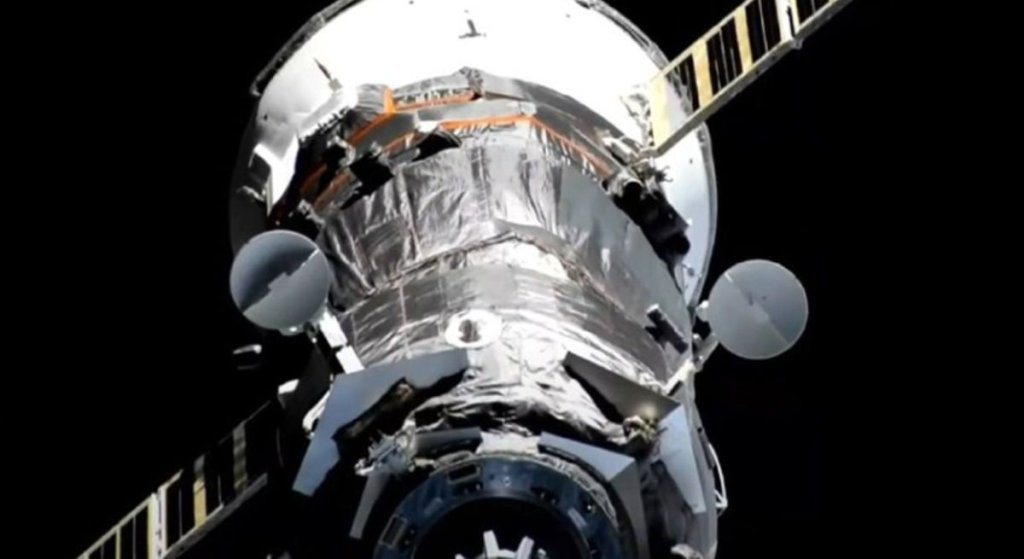A robotic Russian cargo ship stricken by a coolant leak undocked from the International Space Station late Friday (Feb.17) while a cosmonaut snapped photos of it looking for signs of damage.
The Progress spacecraft, known as Progress 82 by NASA and Progress MS-21 by Russia’s Roscosmos space agency, cast off from the space station’s Poisk module at 9:26 p.m. EST (0226 GMT) after nearly four months at the orbiting lab. Its departure came seven days after Roscosmos engineers reported a coolant leak on the uncrewed Progress ship on Feb. 11, prompting astronauts and cosmonauts to conduct a photo inspection of the craft with a robotic arm for signs of damage.
“The reason for the coolant leak is continuing to be investigated between our NASA specialists and Roscosmos counterparts,” Jeff Arend, the manager of NASA’s International Space Station engineering and integration office at the Johnson Space Center in Houston, told reporters in a briefing Friday. “An inspection was completed earlier this week using the Canadarm2 to gather imagery of the suspected area and the teams are evaluating that imagery.”
Related: Russia releases 1st photos of damage to leaky Soyuz spacecraft
After Progress 82 undocked from the station, cosmonauts on the station commanded the ship to rotate 180 degrees so they could snap more imagery of the leaky spacecraft.
“After undocking from the Poisk module of the International Space Station, the outer surface of the Progress MS-21 cargo spacecraft was surveyed. No visual damage was found,” Roscosmos officials wrote in a Telegram update (opens in new tab) translated by Google.
Roscosmos originally planned to deorbit the disposable Progress 82 cargo ship late Friday night. But after its undocking, officials debated additional options for the spacecraft, including potentially redocking it to the station’s Russian-built Prichal module for additional inspections.
Ultimately, the agency opted to dispose of the cargo ship over the South Pacific Ocean as planned. “The inclusion of the Progress MS-21 engine for deceleration to deorbit is scheduled for February 19 at 06:15 Moscow time. As a result, the ship will enter the atmosphere and collapse,” Roscosmos wrote in a subsequent Telegram post (opens in new tab).
The coolant leak on Progress 82 is the second since December on a Russian spacecraft at the International Space Station and occurred just after the arrival of its replacement cargo ship Progress 83 last week. It followed a coolant leak on the Soyuz MS-22 capsule on Dec. 14 that left three station crewmembers — two cosmonauts and a NASA astronaut — without a vehicle to return home.
Roscosmos engineers have determined that a micrometeroid impact likely caused the coolant leak on the Soyuz crew capsule, but the cause of the Progress 82 leak has yet to be determined. Roscosmos initially planned to launch a replacement Soyuz for the stranded crewmembers (cosmonauts Sergey Prokopyev and Dmitri Petelin and NASA astronaut Frank Rubio) on Feb. 20. That launch was delayed to March after the discovery of the Progress 82 coolant leak.
“The launch date of the uncrewed Soyuz MS-23 replacement spacecraft to the International Space Station is under review,” NASA wrote in a Feb. 15 update (opens in new tab).
Arend said the Progress 82 cargo ship’s coolant leak affected the cargo ship’s autonomous avionics systems that control the spacecraft, but it should be able to deorbit safely.
“Our Russian colleagues have done assessments of how long they can operate that vehicle without cooling and we’re well within limits,” Arend said. “So we think all of the avionics will operate as planned and there has been no impact to the propulsion system at all.”
“We’re very confident that the control of the vehicle will be nominal,” he added.
Email Tariq Malik at tmalik@space.com or follow him @tariqjmalik. Follow us @Spacedotcom, Facebook and Instagram.

